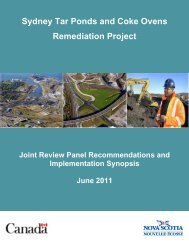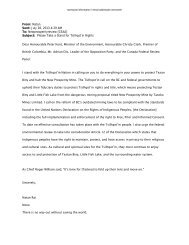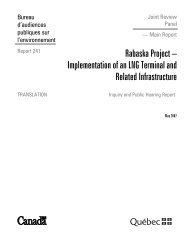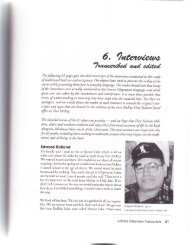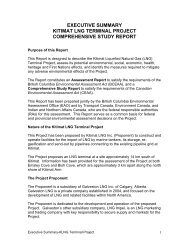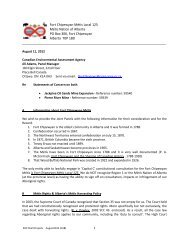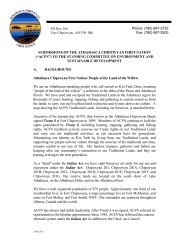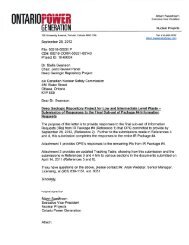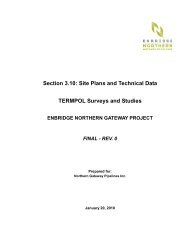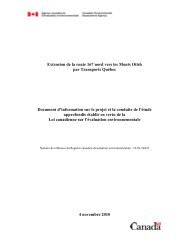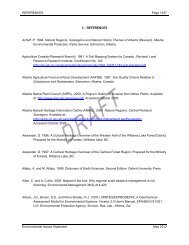Kearl Oil Sands Project
Kearl Oil Sands Project
Kearl Oil Sands Project
You also want an ePaper? Increase the reach of your titles
YUMPU automatically turns print PDFs into web optimized ePapers that Google loves.
Over two decades of jurisprudence has confirmed the practical advantages and constitutional<br />
basis for allowing Canadians to assert their Charter rights in the most accessible forum available,<br />
without the need for bifurcated proceedings between superior courts and administrative tribunals<br />
(Douglas College, at pp. 603-604; Weber, at para. 60; Cooper, at para. 70; Martin, at para. 29).<br />
The denial of early access to remedies is a denial of an appropriate and just remedy, as Lamer J.<br />
pointed out in Mills, at p. 891. And a scheme that favours bifurcating claims is inconsistent with<br />
the well-established principle that an administrative tribunal is to decide all matters, including<br />
constitutional questions, whose essential factual character falls within the tribunal's specialized<br />
statutory jurisdiction (Weber; Regina Police Assn.; Québec (Commission des droits de la<br />
personne et des droits de la jeunesse); Québec (Human Rights Tribunal); Vaughan; Okwuobi.<br />
See also Dunsmuir v. New Brunswick, 2008 SCC 9, [2008] 1 S.C.R. 190, at para. 49). 54<br />
57. Canada’s suggestion that this Panel can exercise its discretion not to assess the<br />
adequacy of Crown consultation is contrary, as above, to “the well-established principle<br />
that an administrative tribunal is to decide all matters”. In that regard, Canada’s “fresh”<br />
approach is contrary to a significant weight of authority; indeed, Canada provides no<br />
authority for the notion that the Panel can avoid the decision squarely before it. In<br />
ACFN’s submission, the Panel must decide whether it has jurisdiction or not. It cannot<br />
avoid this determination, as suggested by Canada.<br />
58. It is difficult to conceive of a situation where a decision in respect of energy<br />
resources on land vested in the provincial Crown can be made without the possibility of<br />
the assertion of an Aboriginal right to consultation. 55 If the Panel denies, or declines to<br />
exercise, its jurisdiction to hear and decide such issues, the province’s ability to<br />
effectively manage energy resources in a manner that is consistent with the rights of all<br />
interested parties could be thwarted by the mere assertion of an Aboriginal/Treaty right<br />
as the issues would be bifurcated. A separate proceeding would be required in each<br />
case to determine the nature, extent and applicability of the Aboriginal/Treaty right and<br />
whether the Aboriginal party was adequately consulted. 56 Separate proceedings are<br />
costly, time-consuming and unnecessary as the ERCA already provides a<br />
comprehensive and effective adjudicative process and the Panel’s decisions on<br />
questions of law are subject to appeal. 57<br />
54<br />
Conway, at para. 79 [underscore added]. See also: Martin, supra note 4 at para. 29.<br />
55<br />
Mikisew Cree First Nation v. Canada (Minister of Canadian Heritage), 2005 SCC 69, [2005] 3 SCR 388 at para. 57.<br />
56<br />
Paul v. British Columbia (Forest Appeals Commission), [2000] 1 C.N.L.R. 176, [1999] B.C.J. No. 129<br />
(BCSC) at para. 87.<br />
57<br />
See: Ibid., at paras. 87-89; and ERCA, ss. 41(1). See also: Conway, at paras. 66, 79.<br />
[ 18 ]



